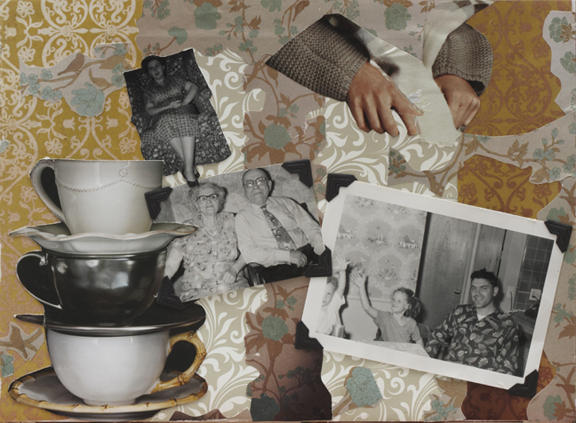
Wallpaper
So many patterns – on wallpaper, wing chairs, housedresses, fancy dresses, pajamas, and ties. Repeated swirls, flowers, cowboys, and lassos. In our house, Baubie’s house, Uncle Aaron’s house, Mary Jo Gross’s house, in the houses whose interiors I imagine when I walk in the alley. Not at school, not at Rosalind’s, which is all silver and simple lines. Wallpaper like this paragraph: crowded with sequence and curving commas.All this wallpaper, upholstery, flannel, and fabric is most often brown, maroon, deep red. Los Angeles light through the windows of old-world houses but the dominant tone is dim dream: dark papered walls and large mahogany bureaus. The Aunties’ apartment is a thick that’s oppressive because of the smells – cabbage from the kitchen, old lady musk – but the velvety texture of Baubie’s and Zadie’s is more like a comfy cave, dark in a different way, crevices to fold in to, thick quilts wrapped over luscious, long sleep.
At our house, too, the floors are dark wood, deeply stained, and describe a wide border around the living room rug. Our maple furniture is lighter than mahogany, but every bedpost is thick and topped with a round knob big enough for hanging shirts and robes. The end tables on either side of the green living room couch rest on stout spindles, while the hefty legs of the dining room table indent the rug beneath. Beige is the word Mama uses to describe the color she chooses for the walls. Paint on the walls, not paper. The room’s windows are covered with big folds of dark cloth that fall to the floor.
And then come the suburbs. First, Uncle Aaron and Aunt Nora on Ranchito. Blonde wood, cream walls. Moving toward light. Uncle Al has the first backyard pool, but we can also swim in the pool next door to Beryl’s when her family moves to Studio City. After we swim, we return to her house. The Dodgers are on the radio, Vin Scully announcing, and everyone listens, Uncle Iz, too, as he barbeques hamburgers and hot dogs which we eat, on these late summer afternoons, seated at a square wooden picnic table under a big umbrella.
What’s old? What’s new? I suppose Baubie and Zadie are old, but that’s not how they seem. They just seem themselves. As does everyone else: aunts, uncles, cousins, great-aunts, baby sister. Stories make the past present and, though we live in our separate houses, the family appears as a being that’s whole, though cropping up in one instant as Uncle Iz and another as Aunty Emma whenever she arrives at Union Station on the train from Detroit.
Judith Tannenbaum is a a writer and teacher whose publications include: Disguised as a Poem: My Years Teaching Poetry at San Quentin, By Heart: Poetry, Prison, and Two Lives (with Spoon Jackson), Teeth, Wiggly as Earthquakes: Writing Poetry in the Primary Grades, Jump Write In!, and a number of poetry books and chapbooks. She currently works as training coordinator with San Francisco’s WritersCorps. “Wallpaper” is part of a new project of prose and collages looking at early childhood sensory memory.
Editor's note: Judith died in 2020. She was my friend.

